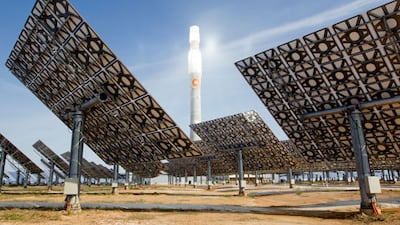The UAE is preparing to go it alone in the fight against climate change as hopes dim for an international treaty to curb carbon emissions.
What's the alternative?:
Energy Join The National as it explores alternative to fossil fuels. Learn more
UN-sponsored negotiations begin today in Durban, South Africa over the future of the Kyoto Protocol, the agreement among industrialised and transitioning nations to cap greenhouse gas emissions that expires next year.
But prospects for a binding agreement to limit the world's temperature rise to 2°C look bleak, with key nations already saying they will not sign a new treaty and others reluctant to commit during an economic downturn.
"We hope that the meeting in Durban can reach an agreement," said Rashid Ahmed bin Fahad, the UAE Minister of Environment and Water. "It really needs leadership from the big countries."
Several of those big countries have already opted out, with Russia, Japan and Canada saying they would not sign up for a second round and the US never joining the first accord.
While publicly pushing for a renewal of Kyoto, the UAE has also expressed support for a strategy called nationally appropriate mitigation actions, in which nations set their own targets in renewable energy generation, carbon emissions reductions or other measures. That could spur a shift from the Kyoto-era model, in which poorer nations sell pollution emission rights to richer ones, towards one where governments voluntarily fund climate targets within their own nations through subsidies.
The UAE is in a delicate position. On one hand, it has positioned itself as a champion of renewable energy through Masdar, Abu Dhabi's multibillion-dollar company that invests in wind and solar power worldwide, and by being nominated as the headquarters of the International Renewable Energy Agency. On the other, it is the world's fourth-biggest oil exporter.
Any future international climate agreement should not place an unfair burden on developing countries and in particular Opec nations, Mohammad Al Sabban, Saudi Arabia's lead climate negotiator, said last week in Riyadh.
The combined GDP of Opec countries, which includes Saudi Arabia and the UAE, is forecast to decline by a quarter by 2050 if nations adopt one of the upper-level targets for the level of carbon dioxide in the atmosphere, 550 parts per million (ppm). Under a more stringent target of 450 ppm, Opec GDP would drop by more than 40 per cent, according to an Opec study cited by Mr Al Sabban.
Also at stake are the carbon credits that the UN has granted over the past decade under the Clean Development Mechanism (CDM), which have allowed developing nations to earn millions of dollars by cutting down on their emissions and selling the credits to markets in Europe and elsewhere.
Should Kyoto not be extended, as much as 80 per cent of today's carbon market - worth US$142 billion (Dh521.62bn) a year - could be wiped out, said Ivano Iannelli, the chief executive of the Dubai Carbon Centre of Excellence. UN carbon credits traded on a European exchange have declined from €13.69 a tonne in May to last Friday's low of of €5.33.
"Because of the economic turmoil across the world it's very unlikely that governments will agree on a new climate deal," said Mr Iannelli. "Tomorrow we will still continue to generate emissions reduction certificates, but we will have a much smaller market than we have today."
The UAE has multibillion-dollar projects that rely in part on the prospect of such carbon credits, from a hydrogen-powered plant whose development is now on hold to a 500km national carbon capture pipeline.
"The CDM-part of the business case is uncertain if there is no Kyoto renewal," said a Gulf climate change official who asked not to be named. "All developing countries … are hoping that that's what will be saved if Kyoto doesn't come through."
twitter: Follow and share our breaking business news. Follow us

